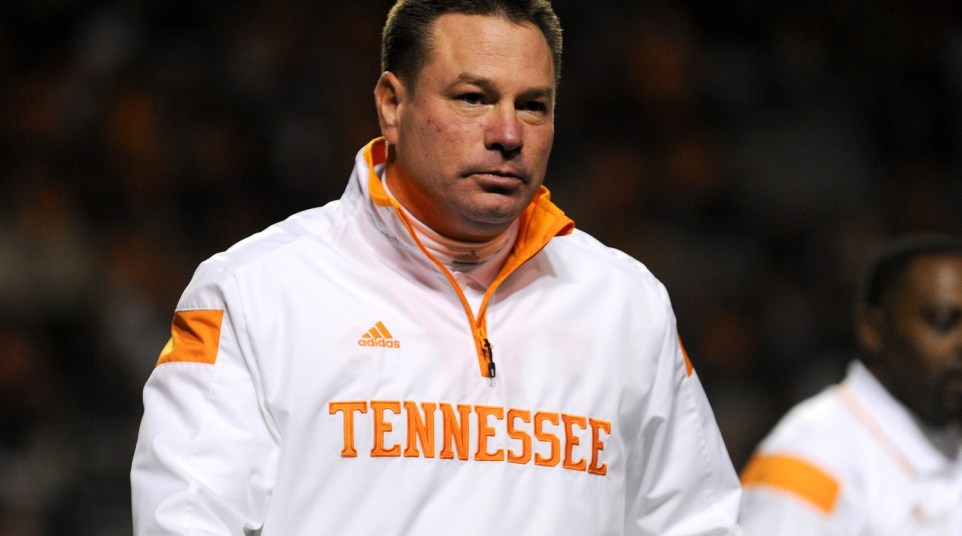Butch Jones' third season at Tennessee in historical context
This is the third season for Butch Jones as Tennessee’s head coach. And it often takes until Year 3 for a coach to have a full grasp of a program with a roster full of players he largely recruited. It’s often when a team will take a big jump.
For example, in Jones’ first two seasons at Central Michigan, the Chippewas were a solid eight-win team in both but also lost in the Motor City Bowl each year. In Jones’ third year in Mount Pleasant, 2009, Central Michigan had one of its best seasons in school history. They won the Mid-American Conference Championship Game and beat Troy, 44-41, in the GMAC Bowl to finish 12-2.
That got Jones hired at Cincinnati. He lasted three years there as well, with the Bearcats finishing 10-3 and beating Duke in the Belk Bowl in his final season.
So let’s take a look at how some other prominent coaches have fared in their third season and what that might foreshadow for the 2015 Vols.
TENNESSEE’S DEREK DOOLEY (2012)
I’m sure that Tennessee fans would prefer to just forget about the Dooley era. That era ended in spectacularly embarrassing fashion with a 41-18 loss at Vanderbilt on Nov. 17, 2012. That snapped Vandy’s 14-game losing streak against Tennessee at home and represented the most points the Commodores had scored against the Vols since a 51-7 win in 1923. Vanderbilt also had its biggest margin of victory over Tennessee since a 26-0 win in 1954. Dooley was fired the next day, with offensive coordinator Jim Chaney coaching the regular-season finale against Kentucky. Don’t feel too bad for Dooley (I’m sure you don’t) as he got a $5 million buyout.
UT’S PHIL FULMER (1995)
Fulmer replaced Johnny Majors midway through the 1992 season. I’m counting 1995 as Fulmer’s third season because it was his third full year. Led by some sophomore quarterback named Peyton Manning, the ’95 Vols finished 11-1 and beat No. 4 Ohio State 20-14 in the Citrus Bowl to conclude the season at No. 3 in the Associated Press poll. UT’s only loss that year was a 62-37 wipeout at Florida, which was absolutely loaded and won the SEC championship. UF lost in the national championship game to Nebraska.
UT’S JOHNNY MAJORS (1979)
The Vols were 7-5 under Majors in 1979, a two-win improvement over the previous season. They played in the Bluebonnet Bowl, the school’s first postseason appearance since 1974, and lost 27-22 to Purdue. Tennessee’s signature win that year was a 40-18 blowout at Neyland Stadium over No. 13 Notre Dame. UT also hung tough at No. 1 Alabama, losing 27-17.
ALABAMA’S NICK SABAN (2009)
Saban has had some incredible teams in Tuscaloosa, but his best might have been that ’09 squad as it finished 14-0 behind Heisman Trophy winner Mark Ingram — the last running back to win it — and beat Texas 37-21 in the BCS National Championship Game. That result, or at least the margin, may have been different had Texas starting QB Colt McCoy not been knocked out of the game due to injury, but that’s a part of football. That remains the only unbeaten team Saban has ever coached.
OHIO STATE’S URBAN MEYER (2014)
Last season was Meyer’s third in Columbus and we all know what happened: the Buckeyes snuck in the College Football Playoff as the No. 4 seed after destroying Wisconsin in the Big Ten Championship Game. Then OSU upset No. 1 Alabama in the Sugar Bowl and No. 2 Oregon in the national title game. OSU is a heavy favorite to repeat this season. If you are wondering, Florida won the national title in Meyer’s second season in 2006 and finished 9-4 the next year.
GEORGIA’S MARK RICHT (2003)
Richt’s best team at Georgia likely was his 2002 squad, which finished 13-1 and was capped by a 26-13 win over Florida State in the Sugar Bowl. The Bulldogs haven’t finished with just one loss since. In Year 3 under Richt in 2003, Georgia was 11-3. The Dawgs lost the SEC Championship Game to LSU but beat Purdue in overtime in the Capital One Bowl.
LSU’S LES MILES (2007)
Miles built from back-to-back 11-win seasons in ’05 and ’06 and in ’07 won the BCS Championship Game over top-ranked Ohio State, 38-24. That LSU team remains the only one since the start of the BCS era to win a national championship with two losses.

